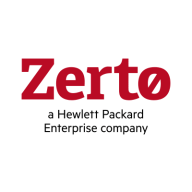

Zerto and VMware Live Recovery compete in the disaster recovery category. Zerto is recognized for its cost-effectiveness and support, whereas VMware Live Recovery wins over users with its comprehensive features, offering substantial value for the cost.
Features: Zerto provides continuous data protection, non-disruptive testing, and flexible recovery options. VMware Live Recovery boasts robust integration with VMware environments, automated failover, and a feature set more aligned with enterprise needs.
Room for Improvement: Zerto could improve its integration capabilities and the automation of failover processes. It may also lack in enterprise-specific features compared to VMware. VMware Live Recovery can benefit from reducing complexity in its initial setup and enhancing its support system. Its pricing could also be more accessible for smaller businesses.
Ease of Deployment and Customer Service: Zerto is easy to deploy with a user-friendly process and provides quick support. VMware Live Recovery might require a more complex setup but integrates well into existing VMware ecosystems, offering support that benefits organizations already using VMware products.
Pricing and ROI: Zerto is notable for lower setup costs and a rapid ROI, making it appealing for cost-conscious businesses. VMware Live Recovery, while more expensive initially, justifies its price with a feature-rich offering that provides long-term value, especially for businesses prioritizing advanced recovery options and integration.
Before, it was a huge cost. It was several thousand dollars to do a DR test, whereas now, I click a button.
The return on investment is evident, as Zerto saves more than 60 percent of time in various operations compared to the previous manual processes.
Most people like me hope we never have to use it. It is like insurance.
They are knowledgeable.
The technical support from VMware is very good and operates based on a service level.
I have never had an issue that was not resolved, and I have never been in a situation where they did not respond.
I would give them a rating of ten because it represents the highest level of support based on the technical knowledge of the support team, response time, and effectiveness of the provided resolutions.
We receive support around the clock, which is excellent.
I would rate it a ten out of ten for scalability.
Customers need to follow good engineering practices for optimal product use.
By adding more hosts and installing VRAs on each, tasks can be efficiently managed.
I promptly delete the malfunctioning elements and set them up again to resume replication, ensuring stability.
The ease of use was so good with Zerto that they were able to migrate things much quicker.
I consulted with tech support, and we determined the solution was to move the main workload to a resource-available ESX box.
It's important for the cost to be justified based on the features used in production.
I would like to see improved integration services with other solutions, such as SIEM management or security monitoring.
The licensing area needs improvement as the cost per virtual machine is high.
If I have 350 objects that I am protecting, I would like Zerto to be able to fire them up in one order, rather than having to manually bring them up in a sequence.
To increase accessibility for small and medium businesses, Zerto should consider a competitive pricing strategy, possibly including subscription-based licensing options.
The main issue with Zerto is its user interface, which lacks flexibility and presents a steep learning curve.
Previously, when acquiring a license for Ethiopian drug supply chains, the price was significantly high, especially after Broadcom joined VMware.
For cloud-based solutions, the cost seems quite pricey, so we stick to on-premises deployment.
If you want a good-quality tool that is robust and does a good job for you, you have to pay a higher price to get that, and Zerto is no different.
However, it can become quite expensive when you start looking at the number of workloads you have in the environment and what you would like to do.
Zerto is easier to set up and use, and it's less expensive.
It is used for data replication between data centers and allows for quick response in times of failure, ensuring data availability.
The capability and the functionality of the features are very helpful for us.
The solution offers a rich set of features, well adapted in the market.
Zerto offers excellent technical support with responsive and helpful experts.
If we were attacked, I could revert to a backup from five seconds before the attack, and no one would know we were attacked.
The replication time and the minor amount of time it takes to sync a new server outside of any of my huge 40-terabyte boxes is ridiculously quick.


Zerto is used for disaster recovery, business continuity, data migration, and ransomware recovery, providing continuous data protection and near real-time replication. Valued for ease of use, efficient failover processes, and versatile integration, it enhances organizational efficiency, reduces errors, and boosts productivity.
We monitor all Disaster Recovery (DR) Software reviews to prevent fraudulent reviews and keep review quality high. We do not post reviews by company employees or direct competitors. We validate each review for authenticity via cross-reference with LinkedIn, and personal follow-up with the reviewer when necessary.